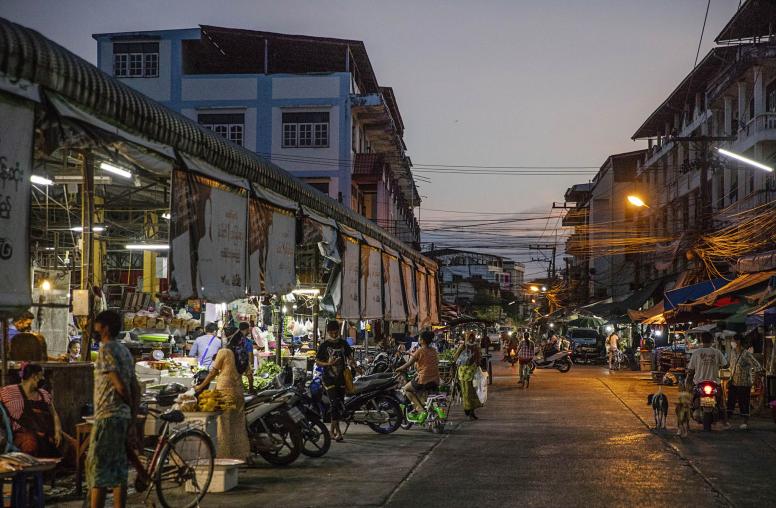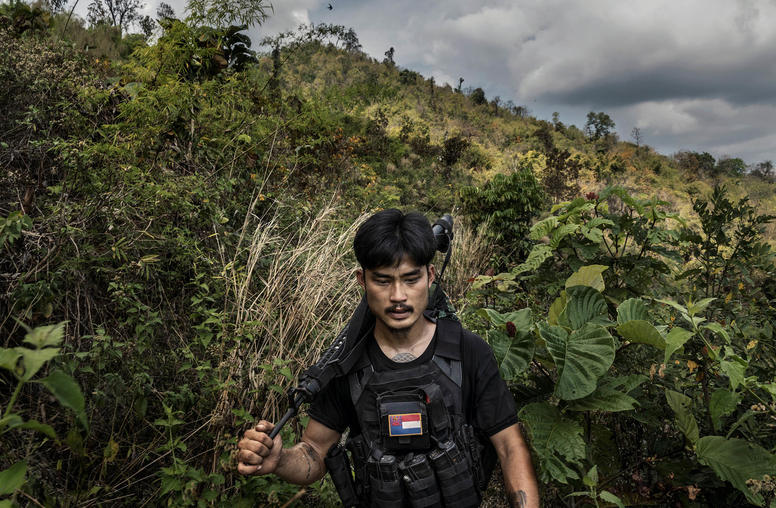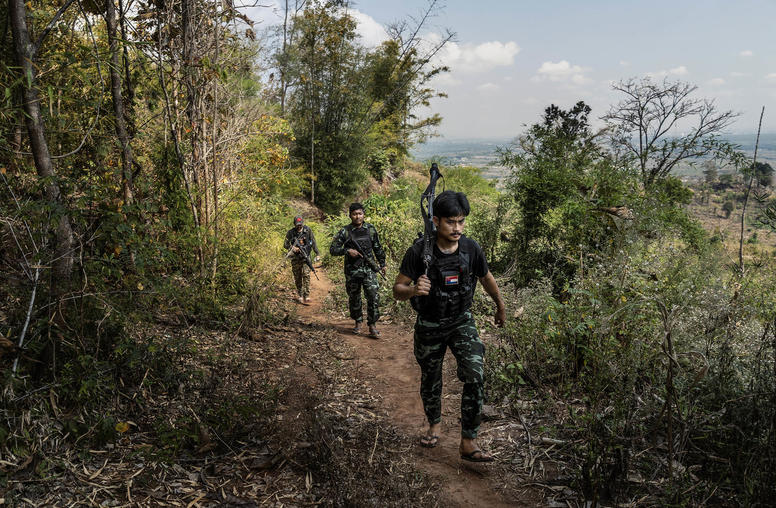Research & Analysis
U.S. Institute of Peace’s articles, reports, tools and other features provide policy analysis, research findings, and practitioner guides. These publications examine critical conflict issues at the center of the Institute’s work to prevent and resolve violent conflict.
The views expressed in these publications are those of the author(s).

The Latest on Southeast Asia’s Transnational Cybercrime Crisis
Increasing scrutiny and exposure of global internet scams based in Southeast Asia has sparked fast-moving developments to quash the schemes and countermoves by the organized gangs behind them. Recent months have seen crackdowns, arrests and internet cutoffs by law enforcement agencies and regional governments. Meanwhile, Cambodia and Myanmar continue to be the most egregious havens for criminal operations, while Laos seems to be demonstrating early signs of concern for the impact of organized crime on its sovereignty.

Myanmar Scam Hubs Revive Fast After China Eases Pressure on Junta
Transnational crime groups in Southeast Asia, hit with intense scrutiny and law enforcement action earlier this year, are moving into new areas and adapting their operations as they revive and expand global scam operations. In Myanmar — a key center of this internet-based criminal activity — extreme political instability combined with the connivance of the country’s military and its militias continue to provide fertile ground for crime groups, albeit in new configurations. At the same time, a sudden shift in China’s posture toward Myanmar’s military regime has eased pressure on the scam industry, allowing criminal networks to further scale up their malign activities.

Southeast Asia Web Scams Reach U.S., Setting Off Alarms for Law Enforcement
From their base in ungoverned stretches of Southeast Asia, international criminal networks are prowling the Internet, seeking to defraud victims around the world with sophisticated and psychologically devastating scams. Gangsters operating out of Myanmar, Cambodia and Laos, relying on forced labor, have spread their tentacles through Asia, Africa and Latin America and increasingly within the United States, stripping gullible prey of at least $64 billion annually. Clearly, to eradicate such a global menace will require a coordinated international response. Even so, the United States is not internally powerless to confront this striking example of how conflict and corrupt governance in distant parts of the world can directly threaten Americans’ security and well-being.

China Forces Myanmar Scam Syndicates to Move to Thai Border
While Myanmar has long been the chief venue for the criminal operations of Chinese-origin gangs in Southeast Asia, these organizations have always stood ready to move — internally or across borders — if their sources of protection dissolved. In recent months, the organized crime kingpins have once again faced a fraying safety net. This time, the cause is the weakening of Myanmar’s corrupt coup regime in the face of a rising, multi-front revolution and, perhaps more importantly, an aggressive push by China’s law enforcement authorities.

Three Years After Coup, Myanmar’s Generals Face an Existential Crisis
Three years after Myanmar’s military overthrew the country’s democratically elected government, the ruling generals — having suffered humiliating battlefield defeats — face an existential crisis. Victories by the diverse ranks of Myanmar’s resistance have invigorated their morale and they are tightening battlefield coordination despite slow progress toward political consensus. The military, meanwhile, is short of manpower and controls a shrinking percentage of the nation.

China’s Influence Increases amid Myanmar’s Instability
Operation 1027 in Myanmar’s northern Shan State has advanced China’s quest to eradicate forced labor scam compounds on its border. However, it has also disrupted the lucrative China-Myanmar border trade and triggered a countrywide attack by resistance forces that has dealt the junta unprecedented battlefield losses. Beijing is concerned that its southwestern provinces will experience economic hardship with the loss of border trade, and that continuing hostilities may affect these provinces’ energy security. The Myanmar army’s desperate request for Chinese help to deal with the fallout from Operation 1027 has probably generated further concern in China that the military may be on the brink of defeat.

Priscilla Clapp on the Recent Success of Myanmar’s Resistance
Increased coordination between various elements of Myanmar’s resistance has sparked massive gains, says USIP’s Priscilla Clapp: “In just a few weeks, the opposition forces have managed to dislodge the military from their bases and encampments” along many parts of the borders with China, Thailand, India and Bangladesh.

Myanmar’s Junta Is Losing Control of Its Border with China
Myanmar’s military has lost control of substantial sections of the country’s border with China in recent days, as forces fighting the coup regime coordinate their attacks in an unprecedented way. The immediate aim of the combined offensive was to shut down lucrative criminal activity in enclaves along the Chinese frontier that are run by military-sponsored border guard forces. Significantly, in doing so, the insurgents took advantage of China’s recent efforts to stifle scams run from the enclaves that target Chinese citizens. This could mark a turning point in the national struggle against military rule, one that would pose serious new challenges to the anti-coup leadership, the international community and Myanmar’s neighbors.

Is Myanmar’s Junta Turning a Corner?
Are conciliatory winds stirring among the leaders of Myanmar’s coup regime, or is the junta engaging in deception and distraction as it struggles on the battlefield against a broad range of resistance forces? The answer is almost certainly the latter. It would not be the first time the ruling generals have sought to stimulate international interest in promoting dialogue solely to enhance their legitimacy abroad.

အရှေ့တောင်အာရှ၌ အမြစ်တွယ် ပျံ့နှံ့လာနေသည့် ရာဇဝတ်မှုခင်းကင်ဆာ
ထိုင်းနိုင်ငံ နှင့် မြန်မာနိုင်ငံကို နယ်နမိတ်ခြားထားသည့် သောင်ရင်းမြစ်တကြောရှိ လက်နက်ကိုင် ရာဇဝတ်ဂိုဏ်းများ ထိန်းချုပ်၍ အာဏာစက်တည်ဆောက်ထားသော နေရာများ ပြန့်နှံ့နေကြပြီး ယင်းတို့ကို ဖြိုခွင်းရန် ကြိုးစားမှုများမှာ အောက်ပါအတိုင်းဖြစ်လေသည် ။ တရုတ်နိုင်ငံသည် ဘေဂျင်း၏ လက်ဝေခံတပိုင်းဖြစ်သော မြန်မာစစ်တပ်ကို သောင်ရင်းမြစ်တလျှောက် တရုတ်ရာဇဝတ်ဂိုဏ်းများ ထိန်းချုပ် လုပ်ကိုင်နေကြသော လောင်းကစားဝိုင်းများနှင့် ရာဇဝတ်မှုကျူးလွန်ရာ အချက်အခြာနေရာများအား ထိုင်းနိုင်ငံမှ လျှပ်စစ်ဓါတ်အားဖြတ်တောက်ရန် ဖိအားပေးခဲ့သည်။ မြန်မာစစ်တပ်၏ လက်အောက်ခံဖြစ်၍ အဆိုပါ ရာဇဝတ်ဂိုဏ်းများ၏ မိတ်ဖက်ဖြစ်သော ဒေသခံနယ်ခြားစောင့်တပ် (BGF) က ယင်းသို့ပြုလုပ်ပါက နယ်စပ်ကုန်သွယ်ရေးကို ပိတ်ဆို့မည်ဟု တန်ပြန်ခြိမ်းခြောက်လိုက်သည်။ ထို့နောက် BGF နှင့် လူဆိုးဂိုဏ်းများသည် ကြီးမားသော မီးစက်ကြီးများကို လောင်းကစားဇုန်များအနှံ့ တပ်ဆင်လိုက်လေသည်။ မြန်မာစစ်တပ်ကလည်း မည်သည့်ရှင်းလင်းချက်မျှ မပေးသကဲ့သို့ တစုံတရာ အရေးယူလုပ်ဆောင်မှုလည်း မပြုလုပ်ခဲ့ပေ။ မြန်မာစစ်တပ်တခုလုံး မဟုတ်လျှင်သော်မှ အချို့သော တပ်မှူးများသည် အဆိုပါ ရာဇဝတ်လုပ်ငန်းများမှ အကျိုးအမြတ်များ ရရှိခံစားနေကြသည်ဟု ယူဆရသည်။ လုပ်ငန်းများကိုလည်း အရှိန်အဟုန်မပျက် ဆက်လက် လုပ်ကိုင်နေကြသည်။